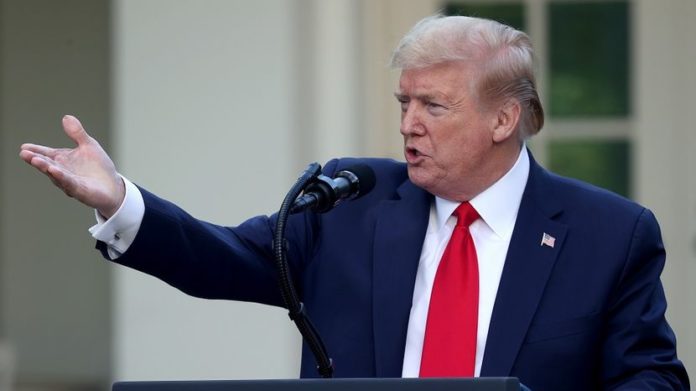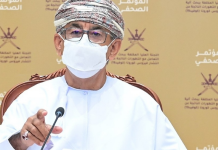(Bloomberg) — The White House issued a strategy to expand U.S. testing for the coronavirus on Monday, accelerating President Donald Trump’s push to reopen the economy even as the nation’s outbreak approaches 1 million infections.
The new guidance to states to help them build testing capacity, developed with the Centers for Disease Control and Prevention and the Food and Drug Administration, was coupled with announcements by retailers including Walmart Inc. and CVS Health Corp. that they would open hundreds of new sites to provide tests.
Trump has endured criticism that the U.S. outbreak has become the largest in the world in part because the government was slow to develop widespread testing to track and contain the disease. The U.S. didn’t exceed 100,000 Americans tested for the virus until March 19, according to the Covid Tracking Project, which compiles state data — more than eight weeks after the first case was reported in the country.
“We are continuing to rapidly expand our capacity,” Trump said at a White House news conference on Monday evening. He said he’s “confident that we have enough testing to begin reopening and the reopening process.”
“We want to get get out country open and the testing is not going to be a problem at all,” he said. “In fact, it’s going to be one of the great assets that we have.”
Read More: White House Turns to Corporate America to Fix Testing Shortfall
A White House official said the administration plans to provide enough tests to all 50 states to screen at least 2% of their residents. The intention is to target the most vulnerable communities, including the elderly and minority populations that have seen higher mortality rates from the virus.
The official asked not to be identified before Trump’s announcement. The president met with retailers before the Rose Garden news conference where he and other officials outlined the strategy.
Shifting Burden
Retailers on Monday announced that they would begin opening up testing at locations across the U.S. CVS Health Corp., said Monday it will open test sites at 1,000 of its drugstores. Walgreens Boots Alliance Inc., another pharmacy chain, said it planned to open testing sites in 49 states and Puerto Rico, with the ability to test 50,000 people a week.
Steve Rusckowski, the chief executive officer and chairman of Quest Diagnostics Inc., said at the news conference that his company would double coronavirus testing to 100,000 a day by the end of the May, at the White House’s urging.
Earlier: White House Urges Reopening Despite Outbreaks at Warehouses
The administration’s new plan is part of its effort to shift more responsibility for testing to states and the private sector. Trump has shown frustration with questions about the government’s failure to more rapidly expand testing and has previously said that states should shoulder more of the burden.
The drugstore locations could substantially expand capacity. CVS will offer self-swab tests to people who meet Centers for Disease Control and Prevention criteria. People will be required to register online and will then be tested at a drive-through window or in a store parking lot. The company said it hopes to be able to conduct 1.5 million tests a month, pending availability of supplies and lab capacity.
Walgreens is partnering with testing giant Laboratory Corporation of America Holdings to triple its testing capacity. The drugstore chain will also test for antibodies, or blood markers indicating a person has already had the coronavirus, at more than 100 of the LabCorp locations inside Walgreens stores.
Testing Plan
In one of the documents the White House issued, called a Testing Blueprint, the administration calls on states to “maximize the use of all available testing platforms and venues” and also “identify and overcome barriers to efficient testing.” Those may include “misallocation of supplies” and “logistical failures,” according to the documents.
The second document describes a three-stage process to expand testing, with check marks in the first two stages indicating that they’re complete. The remaining stage calls for coordination with governors “to support testing plans and rapid response programs.”
The documents say states should themselves develop contact tracing — to identify and quarantine those who have been around people who test positive for coronavirus — offering only “technical assistance” from the federal government. Contact tracing efforts are expected to be a massive undertaking as businesses slowly reopen, with officials needing to contact dozens of people potentially infected by each new case.
“The blueprint lays out the roles and responsibilities to enhance our partnership between the private sector and the public sector, bringing together state and local governments with the federal government to ensure that we can accomplish and achieve our core principles and objectives,” Deborah Birx, the State Department immunologist advising the administration, said at the news conference.
She said the strategy would have three parts — “robust diagnostic testing” of sick people, screening of vulnerable populations such as people living in nursing homes, and a “rapid response program” that would include contact tracing. The goal is to “ensure that every symptomatic case and critically the asymptomatic cases are quickly tracked and traced to ensure that not only can we control this epidemic, but predict outbreaks before they expand.”
Previous Promise
In one federal responsibility outlined by the documents, the administration plans to update its diagnostic testing algorithms and protocols before the return of flu season in the fall, amid concern that ordinary respiratory illnesses could make identifying coronavirus cases more difficult. And the documents say the U.S. is working to improve the accuracy and speed of tests, including antibody tests that could identify Americans who’ve already been infected without knowing it.
Governors and business leaders have expressed concern to Trump that the nation’s testing regime must be more robust for Americans to feel comfortable returning to work. But Monday was not the first time the president has promised expanded U.S. testing for the virus.
Trump praised executives from Walmart Inc., Target Corp., CVS and Walgreens in a Rose Garden news conference on March 13, saying they had agreed to set up testing facilities in their parking lots. But only a handful of locations opened within the first month of Trump’s announcement, leading to criticism of the president for over-promising on the initiative.
So far, about 70 testing sites have opened at drugstores including Rite Aid Corp., CVS and Walgreens, as well as Walmart. Most diagnostic testing is still done at hospitals or by other health-care providers. The result is that testing has been focused mostly on very sick people, resulting in what experts believe is a serious undercount of cases.
Experts estimate the U.S. will have to run at least 500,000 tests daily to start to get people back to work. That’s about 200,000 a day more than the peak number of daily tests conduced within the last week, according to the Covid Tracking Project, a data group following test counts.
The new coronavirus has sickened more than 979,000 Americans and killed more than 55,000 as of Monday, according to data compiled by Johns Hopkins University.






